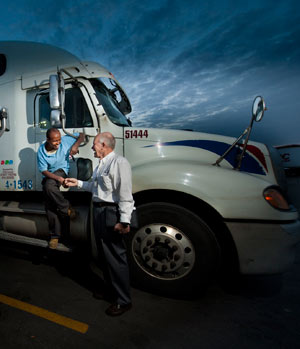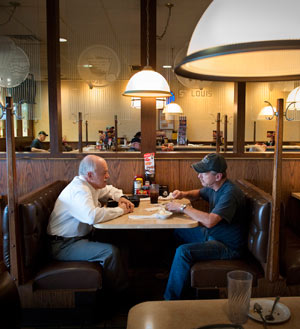FORISTELL, Mo. –– The truck driver sat at the restaurant counter, happy to have someone to talk with at the end of a long day. Deacon Rich Seveska talks with trucker Abdi Rizak from Minneapolis at a truck stop parking lot in Foristell, Mo., Feb. 23. Deacon Seveska is a chaplain at the truck stop, where he spends the evening saying hello to truck drivers, identifying himself as a chaplain and asking basic questions. (CNS photo/Lisa Johnston, St. Louis Review)
Deacon Rich Seveska talks with trucker Abdi Rizak from Minneapolis at a truck stop parking lot in Foristell, Mo., Feb. 23. Deacon Seveska is a chaplain at the truck stop, where he spends the evening saying hello to truck drivers, identifying himself as a chaplain and asking basic questions. (CNS photo/Lisa Johnston, St. Louis Review)
A Protestant, he goes to church about five times a year, mostly because he’s not at home very often.
He works for a good company, one that is concerned for his safety and will pay him if the weather is too bad for him to drive. Once, when working for another company, he was in an accident in freezing rain that involved 110 trucks and 11 deaths. It’s difficult for many truckers to put safety first, with pressures on them to go as many miles as possible and be on schedule, he noted.
The trucker’s conversation with Deacon Richard Seveska also touched on how the challenges of being away from home made his personal life much more difficult. A while back, his mother had fallen, and there was no one there to help her. He eventually had to find a nursing home for her. Making medical decisions for her was compounded by his long absences.
“So how do you handle all this?” Deacon Seveska asked, listening and later handing the man a prayer card as he patted him on the back.
Deacon Seveska and his wife, Kathleen, moved to Foristell from the Chicago area in 2010 and he has a part-time parish assignment. His passion the last dozen years has been what is known as truck-stop ministry.
The deacon spends evenings saying hello to the truck drivers, identifying himself as a chaplain and asking basic questions.
“I just say, ‘Hey, let’s sit down and talk,’ and before long they are talking. It’s just amazing the conversations they get into. It’s a tough life that they live,” he told the St. Louis Review, newspaper of the St. Louis Archdiocese. “They realize, here’s a minister who’s taking the time to listen and is not judgmental. Then they’ll talk about their faith and what they really believe.”
He called the visits a two-way sharing, “and we both walk away fulfilled. I had a trucker one night say, ‘Rich, this is not a meeting of two people. It’s a meeting of two souls.'”
There’s no stereotypical truck driver, he said, though they are almost always male, with some couples out on the road together. An increasing number of truck drivers had jobs in “corporate America” and left to seek a job where they have a little more freedom. “There’s a lot more depth to them than I thought,” Deacon Seveska said. “I didn’t know anything about the trucking industry. But it’s about people. When you sit down and shut up and listen, it’s amazing what you learn.”
Tommy Gee, a truck driver from Oxford, Ala., who has been on the job 20 years, noted that he appreciated visiting with Deacon Seveska. “I’ve been in a truck all day listening to the radio and talking to myself. I can talk your ears off,” he said. Deacon Rich Seveska talks with trucker Bernie Czebatul in a booth at a diner in Foristell, Mo., Feb. 23. Deacon Seveska ministers at the truck stop in Foristell, spending the evening saying hello to truck drivers, identifying himself as a chaplain and as king basic questions. (CNS photo/Lisa Johnston, St. Louis Review)
Deacon Rich Seveska talks with trucker Bernie Czebatul in a booth at a diner in Foristell, Mo., Feb. 23. Deacon Seveska ministers at the truck stop in Foristell, spending the evening saying hello to truck drivers, identifying himself as a chaplain and as king basic questions. (CNS photo/Lisa Johnston, St. Louis Review)
Bernie Czebatul, who drives throughout the United States and western Canada, said his only opportunity to converse with someone is when he is in touch with a dispatcher. “I will talk to the Lord in my private time,” he said.
One of the biggest challenges truckers face is their role as a long-distance parent or spouse. Deacon Seveska has met truckers who have been away from home as long as two years, while it’s common for them to be gone three months at a time. Also not surprising is to find truckers who have been married three or four times.
“There’s a number of problems you run into. It could be money, kids, spouse, drugs, alcohol, suicidal thoughts, you name it. They’re quick to tell you what’s really going on, even when they don’t have much of a religious background,” Deacon Seveska said.
Sometimes he will pray with people, and sometimes they will take the lead. One time a guy at the counter said, “Hey, Rev, you want to say a prayer?”
Assured by the man that it was a serious request, Deacon Seveska began to pray and “everybody at the counter got into it,” the deacon said.
The truck-stop ministry follows a similar ministry at airports and hospitals, which routinely have chaplains. The Catholic truck-stop ministry is supported by the U.S. bishops’ Committee on the Diaconate and Committee on Migration, with the approval of the local bishop. Deacons see the ministry as “being church to people on the move,” those who have little or no time to be part of a typical faith community. The aim is to offer comfort, understanding and support to truckers in a difficult job.
The ministry is a natural one for followers of Jesus, Deacon Seveska said. “A couple thousand years ago there was a guy who just spent time with people. We’re just doing the same thing.”
